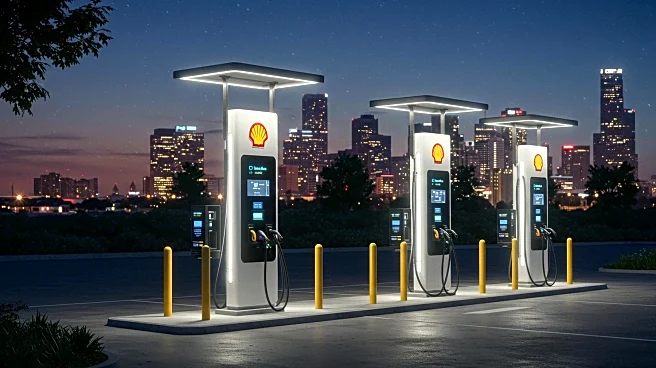What is the story about?
What's Happening?
Shell has announced a strategic shift in its electric vehicle (EV) charging business by prioritizing direct current (DC) fast charging infrastructure at its branded stations and standalone hubs. This move comes after the decision to shut down Volta Inc., an EV charging company Shell acquired in 2023. The company aims to focus on a more scalable and profitable model compared to Volta's retail-based network. Shell's decision aligns with its broader energy transition strategy, which emphasizes low-carbon opportunities where it holds competitive advantages. The company plans to end operations of the Volta Media advertising platform by October 31 and cease charging operations at associated stations by December 31. Shell is exploring the possibility of transferring Volta's infrastructure to other operators.
Why It's Important?
This strategic pivot by Shell is significant for the U.S. EV market as it highlights the growing emphasis on fast charging solutions, which are crucial for the widespread adoption of electric vehicles. By focusing on DC fast charging, Shell aims to enhance its competitive edge in the evolving EV market, which is a priority for the company in the U.S. The shift could influence other players in the industry to reevaluate their strategies and potentially accelerate the development of fast charging networks. This move also reflects the broader trend of energy companies investing in sustainable and low-carbon technologies, aligning with global efforts to reduce carbon emissions and combat climate change.
What's Next?
Shell's transition to fast charging infrastructure is expected to involve collaboration with retail and commercial partners to manage the shift effectively. The company will continue to explore opportunities to expand its EV charging network in high-growth markets, maintaining its ambition to build a scalable e-mobility business in the U.S. As Shell phases out Volta's operations, it will likely focus on integrating fast charging solutions into its existing network of gas stations and convenience retail sites. The outcome of these efforts could set a precedent for other energy companies and influence the future landscape of EV charging infrastructure in the U.S.















